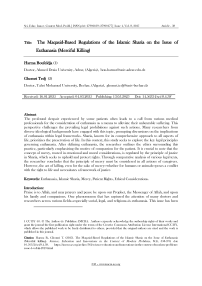The Maqasid-Based Regulations of the Islamic Sharia on the Issue of Euthanasia (Merciful Killing)
Автор: Harma B., Ghomri T.
Журнал: Science, Education and Innovations in the Context of Modern Problems @imcra
Статья в выпуске: 4 vol.8, 2025 года.
Бесплатный доступ
The profound despair experienced by some patients often leads to a call from various medical professionals for the consideration of euthanasia as a means to alleviate their unbearable suffering. This perspective challenges the prevailing legal prohibitions against such actions. Many researchers from diverse ideological backgrounds have engaged with this topic, prompting discussions on the implications of euthanasia within legal frameworks. Sharia, known for its comprehensive approach to all aspects of life, prioritizes the preservation of life. In this context, this study seeks to explore the key legal principles governing euthanasia. After defining euthanasia, the researcher outlines the ethics surrounding this practice, particularly emphasizing the motive of compassion for the patient. It is crucial to note that the concept of mercy, rooted in emotional and moral considerations, is regulated by the principle of justice in Sharia, which seeks to uphold and protect rights. Through comparative analysis of various legal texts, the researcher concludes that the principle of mercy must be considered in all actions of caregivers. However, the act of killing, even for the sake of mercy—whether for humans or animals—poses a conflict with the right to life and necessitates a framework of justice.
Euthanasia, Islamic Sharia, Mercy, Patient Rights, Ethical Considerations
Короткий адрес: https://sciup.org/16010599
IDR: 16010599 | DOI: 14.56334/sei/8.4.38


